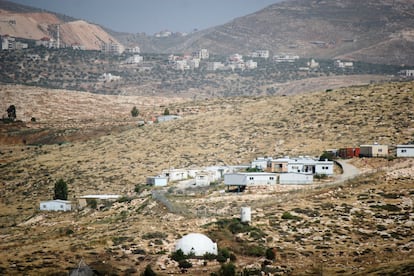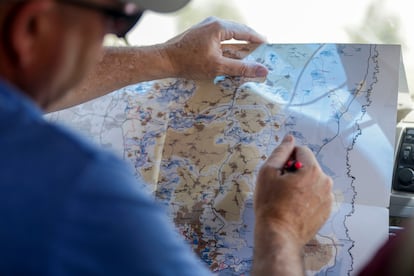Israel takes advantage of Gaza war to expand West Bank settlements
The government has declared as ‘state land’ an area of unparalleled size in the three last decades, while the far-right finance minister has issued a decree to connect 60 settlements that NGOs describe as ‘back-door legalization’


“The Jewish people have an exclusive and inalienable right to all parts of the Land of Israel. The government will promote and develop the settlement of all parts of the Land of Israel — in the Galilee, the Negev, the Golan and Judea and Samaria.” The phrase — using the biblical concept that includes at least the area covering modern-day Israel and Palestine and is included in the policy guidelines of the coalition government led by Prime Minister Benjamin Netanyahu — takes on different forms today, a year and a half after the administration was sworn in, in the deserted hills of the West Bank where every inhospitable hectare of land ends up as a battlefield amid a settlement drive that Israel has quietly accelerated, taking advantage of attention being focused on the invasion of Gaza.
“Look, this one is new. It wasn’t here a few weeks ago. That makes 14 since October alone,” says Dror Etkes, an Israeli activist with unparalelled knowledge of settlement expansion, during a tour of the area. Since February, the Israeli government has declared more than 1,097 hectares “state territory,” which makes it easier to build or expand Jewish settlements. The figure already makes 2024 a record year over the past three decades.
Settlement in the West Bank has been steadily rising for years but the war in Gaza and a government in which religious nationalism — closely linked to the promotion of settlements — occupies a key place have created a perfect mix for it to explode. “Our right to the Land of Israel is anchored in the Bible,” Netanyahu, a secular Jew who increasingly offers gestures to the religious right in the form of biblical references, stated Tuesday.
Etkes himself, who has been following the colonization effort for three decades and heads the NGO Kerem Navot, finds it hard to keep up with new developments. It is increasingly common to see a handful of caravans at a strategic halt. They are secretly assembled by religious ultranationalists who often say that they do not need any other document of ownership than the Bible, in which God bestows these lands to the Jewish people. These groups of young Israelis today know three things: that their own people are installed in the government; that their new settlement will survive, even if it violates Israeli law; and that they only need to exercise patience. Mini-settlements often end up receiving protection and more-or-less covert institutional and private support. Genuine dormitory towns were also just a handful of houses decades ago.
In February, the Israeli Civil Administration, the Defense Ministry agency that manages the day-to-day running of the military occupation of the West Bank, declared 264 hectares of state land between the settlements of Ma’ale Adumim and Kedar, east of Jerusalem. A month later, it added another 800 hectares in the Jordan Valley, to which a few dozen more have since been tacked on. To understand the dimension of the recent expansion, the total is slightly less than half of the 2,400 hectares declared state land between 2018 and 2023.
The declaration of state land is based on a self-serving Israeli interpretation of a 19th-century Ottoman-era law to take advantage of crops. Since international law prevents Israel — as an occupying power — from confiscating land for its own benefit, it revived the Ottoman law at its convenience to appropriate lands in the West Bank that had been uncultivated for years. The reason for this is that the original owners became refugees, because the Israeli army prohibited access to the lands, because they feared attacks by settlers. The second government of Yitzhak Rabin (1992-1995) ordered a halt to the establishment of new settlements when it was negotiating the Oslo Accords, but Netanyahu resumed them that same decade in his first term in office. Through this legal interpretation, Israel has declared 16% of the West Bank state land — which it has occupied militarily since it seized it during the 1967 Six-Day War — according to data from Peace Now, the country’s leading peace NGO.

Abandoned villages
A long black pipe runs from a military base to Malajei Hashalom, providing water, even though it is forbidden in theory as Israel considers the settlement illegal. Just above the ruins of Ein Ar Rashash, a Bedouin village whose inhabitants left for fear of settler aggression, another settlement has sprung up: Gal Yosef. Etkes estimates that between 15,000 and 20,000 hectares have been inaccessible to Palestinians since October.
A barrier of stones and sand prevents the more than 3,000 inhabitants of Duma from going out onto the road. It is, along with the smaller Mughayir, the only Palestinian town standing between Ramum, to the west, the city of Jericho, near the Jordanian border, and the settlement of Ma’ale Efraim. “A year ago, you could see Bedouin shepherds here, and now it’s deserted,” Etkes says. Only the remnants of their former shanty towns, which were removed to less dangerous parts of the West Bank, or new attempts at settlements, can be seen.
On the Alon road, which crosses the West Bank perpendicularly, and between signs and barriers in Hebrew painted with phrases such as “revenge” or “death to the Arabs,” there are no cars with green or white license plates — those of Palestinians without permission to access Israel or other areas of the West Bank under its control, such as East Jerusalem. Partly this is out of fear following the murder a month ago of an Israeli teenager, which sparked a wave of attacks on Palestinians, Etkes explains.
Last month — with the embers of the Iran-Israel escalation and the focus on protests on U.S. university campuses over an invasion that has left more than 35,000 Palestinians dead — Israeli Finance Minister Bezalel Smotrich ordered ministries to connect infrastructure, provide municipal services, and construct public buildings in some 60 small settlements that the country itself considers illegal. It is the implementation of a decision from last year in which the government urged the necessary measures be taken to “connect to essential infrastructure and construct public and educational buildings” in certain settlements that “the government intends to act to regulate.” Some were already connected, but through nearby settlements or to infrastructures considered temporary.
Although less loud and popular than Minister of National Security Itamar Ben-Gvir, who is next on the electoral list, Smotrich is the most powerful ultra-nationalist in the government. Not only because his hand controls the purse strings but also because, during negotiations with a Netanyahu desperate to return to power, he snatched a post in the Defense Ministry that gives him broad command over civilian affairs in the West Bank.
The NGO Peace Now defined Smotrich’s decision as “legalization by the back door.” The measure sidesteps international condemnation and legal issues and protects settlements from demolition, which the current government has virtually stopped enforcing but the next one might resume. According to local media, the minister’s document includes instructions such as the establishment of educational institutions, the construction of roads, and related to day-to-day matters such as health insurance funds.
The decision de facto equates 500 small outposts to settlements. Although all settlements — in which some 700,000 people live — are illegal under international law, Israeli political vocabulary usually distinguishes between “neighborhoods” (the large, residential areas in East Jerusalem), “settlements” (those in the West Bank that it considers legal, generally established decades ago) and “outposts,” smaller and considered illegal by Israel. These began to be established in the 1990s, after the signing of the Oslo Accords.
The departure of Palestinians for fear of aggression by settlers — who have become increasingly indistinguishable from soldiers — have also skyrocketed since October, following the massive mobilization of reservists. Nearly 20 localities, with more than 1,000 inhabitants (generally Bedouins belonging to the same family clan and living on agriculture and livestock), have dismantled their homes and set out in search of a less exposed site. It is a phenomenon — often with the connivance or passivity of the military — closely linked to the expansion of the settlements in the form of farms, which allow for the control of a lot of territory with little effort.
The increase in attacks on Palestinians and left-wing activists, the settlers’ growing sense of impunity and, in general, the atmosphere that has prevailed since the Hamas attacks on October 7 leads Etkes to take precautions. He does not own a vehicle, to avoid the settlers becoming familiar with him, and he does not want the one he rents or his face to appear in photos, to make it difficult for him to be identified. The stops are short. At one, two armed security guards ask what he is doing. There is tension and they insult him as he gets back in the car, but things don’t escalate. “I have the right accent and skin color,” he says of being an Israeli Jew.
Sign up for our weekly newsletter to get more English-language news coverage from EL PAÍS USA Edition







































